
International Public History
Scope & Guideline
Advancing the Dialogue of History in Society
Introduction
Aims and Scopes
- Decolonization and Social Justice:
The journal emphasizes the importance of decolonizing historical narratives and practices, encouraging contributions that explore social justice through public history. - Digital Public History:
A significant focus on the role of digital technologies in public history, examining how digital platforms can transform historical interpretation and accessibility. - Participatory and Community-Based Approaches:
Promoting participatory research methodologies that involve communities in the storytelling process, allowing for diverse voices and narratives to be highlighted. - Memory and Collective Identity:
Exploring how public history contributes to collective memory and identity, particularly in relation to marginalized communities and historical injustices. - Interdisciplinary Perspectives:
Encouraging interdisciplinary research that integrates insights from various fields such as sociology, anthropology, and cultural studies to enrich public history practices.
Trending and Emerging
- Decolonial Approaches:
Recent publications increasingly emphasize decolonial methodologies, highlighting the need to reassess and reconstruct historical narratives from marginalized perspectives. - Impact of Digital Technologies:
There is a growing interest in how digital tools and platforms can reshape public history, with themes exploring digital engagement and virtual representations of history. - Emancipatory Politics:
Emerging themes focus on the role of public history in fostering emancipatory politics, particularly in contexts transitioning from oppressive regimes. - Mental Health and Wellbeing:
Research exploring the connections between public history engagement and visitor wellbeing is gaining traction, indicating a shift towards understanding the emotional impact of historical narratives. - Community Engagement and Activism:
Themes centering around community involvement and activism in public history are becoming more prevalent, reflecting a commitment to social justice and participatory practices.
Declining or Waning
- Traditional Historical Narratives:
There seems to be a waning focus on conventional historical narratives that do not engage with contemporary issues or diverse perspectives. - Local History without Broader Context:
Contributions centered solely on localized historical accounts without connecting to broader social or global themes appear to be less frequent. - Static Museum Practices:
The exploration of static, traditional museum practices is declining as the journal increasingly prioritizes innovative and interactive forms of public engagement. - Non-Digital Public History:
As digital public history becomes more prominent, discussions surrounding non-digital public history practices are becoming less common. - Historical Reenactment without Critical Analysis:
The journal has moved away from papers that focus on historical reenactments without critical engagement or reflection on their implications.
Similar Journals

Cuadernos de Historia Contemporanea
Connecting Scholars in the Heart of MadridCuadernos de Historia Contemporanea is a prominent academic journal published by the UNIV COMPLUTENSE MADRID, SERVICIO PUBLICACIONES, dedicated to the field of contemporary history. Since its inception in 1988 as an Open Access publication, it has fostered a rich dialogue among historians, researchers, and students by providing a platform for the dissemination of high-quality scholarship across diverse topics in socio-political and cultural history. With an ISSN of 0214-400X and an E-ISSN of 1988-2734, this journal aims to enhance accessibility to research outputs and encourages scholarly contributions that advance understanding of contemporary historical processes. Located in Madrid, Spain, it plays a vital role in academic discourse within the European and global context, making it an essential resource for anyone seeking to deepen their knowledge in modern historical studies.

Historisk Tidskrift
Pioneering Perspectives in Historical Research.Historisk Tidskrift, published by the SVENSKA HISTORISKA FORENINGEN in Sweden, is a pivotal journal in the field of historical studies, holding an ISSN of 0345-469X. With a history dating back to 1973, this journal serves as a platform for disseminating significant research and discussions in the discipline of history. Although it currently operates under a traditional subscription model, the journal's contributions are invaluable, particularly as it seeks to engage with a wide array of historical narratives and methodologies. In the 2023 category rankings, Historisk Tidskrift is positioned in the fourth quartile for History, a testament to its ongoing relevance in scholarly discourse, whilst ranking #1224 out of 1760 in the Scopus database for Arts and Humanities - History. This makes it a crucial resource for historians, researchers, and students alike, dedicated to exploring and expanding the understanding of historical contexts and interpretations.
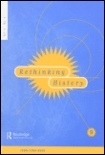
RETHINKING HISTORY
Transforming the Past through Interdisciplinary InsightRETHINKING HISTORY is a prestigious academic journal published by Routledge Journals, Taylor & Francis Ltd from the United Kingdom. With an ISSN of 1364-2529 and an E-ISSN of 1470-1154, this journal serves as a vital platform for critical discourse and innovative scholarship in the field of history. Since its inception in 1997, RETHINKING HISTORY has continuously strived to push the boundaries of historical study, providing a forum for interdisciplinary research and theoretical exploration. It holds an impressive Q1 ranking in History, reflecting its high impact and influence, with a Scopus rank of #203 out of 1760, placing it in the 88th percentile among history journals. The journal publishes original articles, reviews, and theoretical pieces that challenge conventional narratives and encourage new perspectives on historical events and methodologies. Although it is not currently an Open Access journal, RETHINKING HISTORY plays an essential role in shaping contemporary historical research and thought, appealing to a diverse audience of researchers, professionals, and students committed to the exploration of history’s complexities.

Lithuanian Historical Studies
Charting the Course of Lithuania's Historical NarrativeLithuanian Historical Studies is a respected academic journal published by BRILL, focusing on the nuanced exploration of cultural, historical, and sociopolitical dynamics within Lithuania and its historical context. With an ISSN of 1392-2343 and an E-ISSN of 2538-6565, this journal aims to disseminate scholarly research that contributes to the understanding of Lithuania's cultural heritage and historical developments. Although it operates without an open-access model, its content is essential for researchers, professionals, and students interested in History, Cultural Studies, and Religious Studies. Ranked in the fourth quartile across several categories in 2023, including Cultural Studies and Sociology and Political Science, it provides a platform for academic discourse among those researching in the field. Despite its modest Scopus rankings, it plays a critical role in advancing knowledge within these disciplines and fostering dialogue across them, making it a valuable resource for anyone engaged in the study of Lithuanian or broader Eastern European history.
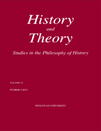
HISTORY AND THEORY
Pioneering New Perspectives in Historical and Theoretical StudiesHISTORY AND THEORY, published by Wiley, stands as a premier journal in the realms of history and philosophy, consistently recognized for its scholarly contributions since its inception in 1968. With an impressive Q1 ranking in both History and Philosophy categories for 2023, it represents the top tier of academic rigor and impact in the field. This esteemed journal, indexed under ISSN 0018-2656 and E-ISSN 1468-2303, offers a platform for innovative research and critical discourse that challenges conventional interpretations and fosters rich theoretical explorations. Despite being a subscription-based journal, its broad array of contributions plays a pivotal role in shaping intellectual discussions among researchers, professionals, and students alike. With its central hub located in Hoboken, New Jersey, HISTORY AND THEORY engages an international readership, making it an influential voice for those immersed in understanding the complex interplay of historical contexts and philosophical thought.
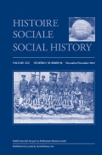
HISTOIRE SOCIALE-SOCIAL HISTORY
Innovating Research on the Social Fabric of HistoryHISTOIRE SOCIALE-SOCIAL HISTORY, published by the HISTOIRE SOCIALE DEPT HISTORY at the University of Ottawa, stands as a pivotal resource in the fields of history, sociology, and political science. With an ISSN of 0018-2257, this Canadian journal has been contributing to academic discourse since its inception in 1976, covering a diverse range of topics that explore the social dimensions of historical events and phenomena. Although it currently holds a Q4 ranking within its categories and shows potential for growth, its committed aim is to foster scholarly dialogue and disseminate innovative research that challenges conventional narratives. With publication years converging as recently as 2024, the journal remains relevant and accessible to both seasoned researchers and emerging scholars. Its commitment to understanding the intricate connections between society and history makes it an invaluable resource for professionals and students alike, encouraging a deeper exploration of the past and its impact on contemporary issues.

Journal of Belgian History-Revue Belge d Histoire Contemporaine-Belgisch Tijdschrift voor Nieuwste Geschiedenis
Revealing the Stories that Shaped BelgiumThe Journal of Belgian History-Revue Belge d'Histoire Contemporaine-Belgisch Tijdschrift voor Nieuwste Geschiedenis is a prominent academic publication dedicated to the exploration and analysis of contemporary Belgian history. Published by SOMA-CEGES, this journal serves as a vital resource for researchers, professionals, and students alike, providing a platform for scholarly discourse and the dissemination of innovative research in the field. Despite its historical significance, the journal faced a hiatus in its Scopus coverage from 2019, yet it retains a strong identity within the Arts and Humanities category, holding a Scopus rank of #1123 out of 1328, placing it in the 15th percentile. This underscores the opportunities for growth and impactful contributions within the journal's scope. By focusing on the intricacies of Belgian history, the journal encourages rigorous investigation and a deeper understanding of Belgium's past, making it an essential reference for anyone interested in European historical narratives.
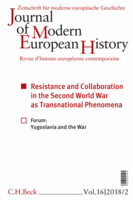
Journal of Modern European History
Connecting Scholars to the Heart of European HistoryThe Journal of Modern European History, published by SAGE PUBLICATIONS LTD, is an essential resource for scholars and practitioners in the field of history, particularly focusing on modern European developments. With an ISSN of 1611-8944 and E-ISSN of 2631-9764, this journal boasts a reputation as a Q2 journal in the Arts and Humanities - History category, ranking in the top 25% of its field with a Scopus rank of #404 out of 1760 publications. With its converged years spanning from 2010 to 2024, this journal aims to provide cutting-edge research articles that deepen the understanding of modern European historical events, themes, and methodologies. As a pivotal platform for scholarly discourse, it supports vibrant academic exchange while offering avenues for researchers, professionals, and students to engage with innovative thought in the history domain. For those seeking to expand their knowledge or contribute to the field, the Journal of Modern European History serves as a vital tool for both insight and inspiration.
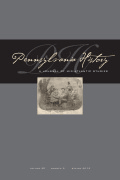
Pennsylvania History-A Journal of Mid-Atlantic Studies
Illuminating the Cultural Landscape of the Mid-AtlanticPennsylvania History: A Journal of Mid-Atlantic Studies is a prestigious academic journal published by Penn State University Press, dedicated to advancing the scholarship of historical studies in the Mid-Atlantic region of the United States. With an ISSN of 0031-4528 and an E-ISSN of 2153-2109, this journal has been a vital resource since its inception, providing critical insights into the cultural, social, and political landscapes of Pennsylvania and its neighboring states. Ranking in the Q2 category of the 2023 history quartiles, it plays an essential role in fostering dialogue among historians, researchers, and students alike, attempting to elevate the discussion surrounding Mid-Atlantic history. Notable for its consistent publication across multiple decades—specifically from 1971 and its converged years—it has established a legacy of scholarly excellence. While access options remain non-open, the journal curates comprehensive scholarly articles and contemporary research that collectively situate Pennsylvania within the broader narratives of American history. Engage with the robust academic contributions of Pennsylvania History to explore rich historical themes and narratives that shape our understanding of the Mid-Atlantic region.

AMERICAN HISTORY
Connecting the Dots in American Historical DiscourseAMERICAN HISTORY is a pivotal journal published by HISTORYNET, dedicated to the exploration and analysis of historical narratives, events, and figures that have shaped the United States. With an ISSN of 1076-8866, this journal offers a comprehensive platform for historians, scholars, and students to publish and access critical research and discussions in the field. Although categorized in the Q4 quartile in the history domain according to 2023 metrics, its targeted scope from 2009 to 2023 ensures a rich reservoir of contemporary and historical research articles. Positioned at Rank #1711 out of 1760 in the Scopus database, AMERICAN HISTORY caters to a niche audience passionate about uncovering the complexities of American past. While it does not offer open access, its printed contributions are invaluable for those aiming to deepen their understanding of historical context in modern society. AMERICAN HISTORY stands as an essential resource for anyone engaged in detailed historical research and discourse.